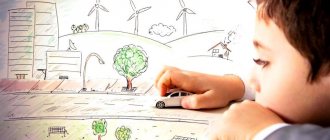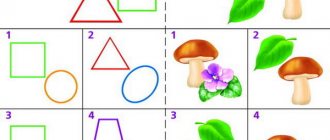Types of intelligence
Psychologist Howarth Gardner proposed the theory of multiple intelligences. Its essence is that there are 8 types of intelligence. Several of them dominate in humans. They determine personality traits. They can be noticed at an early age and developed.
Type one - natural
The child feels and protects nature, loves animals, birds, plants. Advocates for the environment: sorts garbage, refuses animal food, for example. Among people of this type there are astronomers, chemists, ecologists, veterinarians, and astronomers.
The development of intelligence in children of “ecologists” occurs through unity with their element. Go to the forest, walk in parks, watch movies, read books on the topic.
Type two - musical
At an early age, kids feel rhythm and false notes, and sing along to the beat. They have developed hearing and voice. Preschoolers select any melody by ear, master musical instruments, sing beautifully, write poetry and music.
The early intellectual development of preschool children consists of encouraging the child's love of music. Enroll in a music school, go to concerts, listen to good music at home, organize creative evenings where the child will recite his poem or sing a song.
In the future, your child may become a composer, musician, singer, producer.
Type three - logical-mathematical
Kids easily solve puzzles, assemble geometric pyramids and puzzles. Preschoolers solve problems on logic and equations.
In the future, your child may choose a profession in the IT field, becoming a mathematician, economist, physicist, engineer, financier, or detective. And if he has developed musical intelligence, then he can become a first-class drummer.
What are the ways to develop the intellectual abilities of “logic” children? Let's collect geometric sorters and pyramids, puzzles. For younger and middle preschoolers - Nikitin's games (squares, cubes), Seguin's boards, puzzles.
Type four - existential, philosophical, spiritual
Since childhood, such children have a rich inner world. They wonder about the meaning of life and their mission beyond their age. In young children it manifests itself in the form of reasoning, curiosity, discussions, and arguments.
Your child can become a philosopher, psychologist, archaeologist, historian, politician
Recommendations for developing the intellectual abilities of “philosopher” children: enrich the inner world of your child. Travel around cities and countries, visit museums and exhibitions, go on excursions. Let the child see the diversity of our world
Type five - kinesthetic, bodily
Children are active, restless, flexible. They confidently control their body and express emotions and thoughts through it. They have developed spatial thinking: they feel time and surrounding objects. Among people with bodily intelligence there are many athletes, dancers, conductors, surgeons, and artists.
What are the ways to develop the intellectual abilities of “kinesthetic” children? Don't limit them! Let them run, jump, express themselves through movement. Sign up for the sports section.
Type six - social, interpersonal
Sociability, desire for new acquaintances, empathy are the hallmarks of children. There are many leaders among them, they are the first to approach people and are charismatic. In a children's group, your child will support and help a friend, and will study well at school.
As an adult, he will choose a profession related to working with people: teacher, psychologist, educator, social worker, HR manager. All successful leaders have this type of IQ that dominates.
Recommendations for developing the intelligence of children who are “communicators”: broaden their horizons. Travel, meet new people. Take part in forums, let your child speak publicly.
Type seven - spatial, figurative
Phenomenal memory, spatial and figurative thinking, location orientation, imagination, love of art - these are the characteristics of children.
They can read the book once and reproduce what is written page by page. Illustrations, objects, faces - children remember them in detail. Not a single detail escapes their keen gaze. Your child can find himself in the following professions: pilot, driver, architect, engineer, sculptor, sailor, builder.
The best toys for developing children's intelligence are mazes, puzzles, construction sets, and 3D modeling.
Type eight - linguistic, verbal
The kids love to write: they express their thoughts on paper, and at school they write essays and summaries better than anyone else. They are also excellent speakers. It is interesting to communicate with them: they tell and make up stories. Among them are many writers, journalists, translators, speakers, historians, and actors.
Talk to the baby, invite him to talk, read. Children's intellect develops through speech.
Additional type - personal, internal
The guys feel themselves and are aware of their desires. They understand what they want and what is needed for it. Planning for the future. At an early age, this manifests itself in one’s own opinion on everything. They adequately assess their strengths and capabilities.
Internal intelligence is well developed by independent games. A recommendation for developing children's intelligence is to teach them to play and enjoy the process. Encourage interest in knowing yourself, help with this. Among people with this type of IQ there are good psychologists and social workers.
Is it possible to develop intelligence in an adult after 40 years of age?
Yes, the answer to this question is clear and positive. You can increase your level at 20, 35, and 55 years old. What changes is the time it takes to get results and the amount of effort required.
What can an adult do to improve the functioning of her own brain?
- Eliminate barriers that may prevent you from moving forward: - turn off the fear of failing in new activities; - realize that just knowledge of a narrow topic, even at the highest level, does not make a person smarter on all fronts, and often, on the contrary, greatly interferes with the versatile harmonious development of the intellect and personality; - even if you are already an established super-pro in your business, your motivation should not suffer, especially if you already have children: work out with them, for them and for yourself.
- Do you understand the importance of regular exercise? The human brain is the same muscle. If it is not exercised for years, it will become flabby, but it can be brought into shape through a cycle of classes to increase its intellectual level through the development of creative abilities and logical thinking. Solve logical problems with your children, solve riddles and mathematical puzzles
, play chess. - Read more books. But even if you have speed reading skills, don’t forget that sometimes you just need to read for pleasure: delve deeply into the plots, enjoy the works, “living the adventures of the main character.” A good book (remember what works inspired you in childhood and youth) can work as a full-fledged “vitamin complex for the mind.” This is fertile soil, but in order for the brain to be constantly in good shape, it must be regularly trained.
How to increase the level of intelligence in an adult and a child at the same time?
Engage in sports, reading and the comprehensive development of logical thinking and intellectual abilities together as a family.
Okay, everything is clear with sports activities and reading. It would be nice to find a place where the most interesting and diverse tasks, riddles, puzzles and other tasks for the full development of intelligence are collected...
We have created and are constantly improving a platform for the development of small and adult smart people. Are you already training on LogicLike? If not, it's time to try!
Most parents don't have enough time to try everything that might be beneficial for their child. But we all know that this is just a matter of priorities.
Perhaps the time has come to take responsibility not only for regular family offline activities, but also for joint online activities?
Why did 250,000 children and parents choose LogicLike?
- We have created a full-fledged course to form a logical foundation of thinking;
- You can study on a tablet, smartphone, computer or laptop;
- you can start with 20-30 minutes a day, it is important to do a mental warm-up “without downtime” - regularly, every day;
- set a time that is convenient for everyone, and teach your child discipline: make your joint training of intellectual abilities a family ritual, for example, after dinner;
- During the summer holidays, some children should increase the load to keep their brain in good shape.
Develop logic and intelligence playfully, easily and with pleasure. Form a healthy habit of exercising for 20 minutes every evening.
What influences a child’s intellectual development
Psychologists identify 6 factors:
- Intrauterine development. The course of pregnancy, complications, childbirth, mother’s health status;
- Genetics. For example, one kid “clicks” math problems in his head like his grandmother, while another draws amazingly like his mother. The hereditary factor influences the intellectual development of preschool children;
- Activities with your child. Do you want a developed child? Exercise with him regularly! The baby will “develop” without this. The question is how high quality;
- Lifestyle. The psychological climate in the family, daily routine, walks in the fresh air, sufficient sleep, the attitude of mom and dad towards the child, habits affect mental abilities;
- Social factor. The financial situation of the family, the ability to take the child to educational activities, to provide a good education. If “developers” are expensive for you, it doesn’t matter. Practice at home. Such activities are useful for the intellectual development of preschool children;
- Personal characteristics of the baby. Character and temperament play a role.
Assiduous, inquisitive children love to learn new things and learn material better than hyperactive fidgets.
Conclusion
Early development methods are offered by a large number of child care institutions and it is difficult for parents to choose among all this diversity. Some organizations teach children using a specific method. Other organizations combine different areas.
Children's children recommend giving preference to the option of combining different areas of children's development. In our classes, we pay attention to 10 skills at once, described by scientists and psychologist Tony Buzan, the author of the method of memorization and organization of thinking. Sign up for our children's clubs and kindergartens. We will contribute to the comprehensive development of your child.
Stages of intelligence formation
Begins during intrauterine development. The peak occurs in early childhood, preschool and school periods. There are 4 stages.
Stage 1: sensorimotor intelligence. A baby from birth to 2 years old learns the world through movements and senses. Understands that his actions lead to consequences. Realizes that he is autonomous from the world around him. Operates with specific objects.
Stage 2: preoperative period. Between the ages of 2 and 7 years, an “internal plan” is gradually formed. The children learn to use symbols. For example, in the game of doctor, a pencil is used as a thermometer, and a ship is imitated by a box. Children cannot yet perceive some types of experience. Thinking is egocentric: the child does not understand that there are other opinions and points of view. With this understanding, egocentrism goes away.
Stage 3: specific operations. Applies to ages from 7 to 11 years. The guys use and logically manipulate symbols. They stack non-existent kittens and classify objects. Understand the principle of reversibility of operations and conservation of matter (when modeling dough is divided into lumps, its quantity will not change). Children don't know how to generalize. Problems are solved separately.
Stage 4: formal operations in the development of children's intelligence. Children aged 12 years and older think abstractly and concretely. Analogical thinking, imagination, understanding of metaphors, and the ability to listen to the opinions of others come in adolescence. Operations move to the “internal plane”: thinking does not require a connection with real objects and events.
Types of intelligence and their characteristics in children
Developing children's mental abilities is an important part of any parent's life. Solving diverse problems and performing complex exercises helps to comprehensively develop mental abilities. Discipline and methodicality play an important role in this. Classes should be conducted systematically. They form perseverance and develop memory.
Ways to develop children's intellectual abilities
Do you dream of a bright future for your child? Do you want to enroll him in a prestigious lyceum? If you increase his chances of a successful life, develop him from the cradle.
Here are some recommendations for developing children's intelligence.
Consider the age of the baby. Offer relevant games. Select them taking into account the current development and capabilities of the child. Toys should be “with reserve”: a little more difficult than a son or daughter can make today.
Approach the task comprehensively. With the intellectual development of a child, psychology recommends developing logic, memory, attentiveness, analytical abilities, communication skills, and speech. Don't focus on one thing. At the same time, focus on the dominant type of intelligence.
Alternate mental and physical activity. Don't focus on mental development - physical development is no less important.
Don't make intellectual development an end in itself. Don’t turn your baby’s life into a routine of developmental activities. Don't deprive him of his childhood.
At what age should a child’s mental education begin?
Mental education is a pedagogical process that is aimed at developing cognitive activity. The goal is to improve the level of development of children. The important condition is not to give as much knowledge as possible. The main thing is to develop ways of cognitive activity.
The human brain is highly active in the first 7 years of life. A child is naturally very curious and absorbs a huge amount of different information. The task of parents is to support the child’s curiosity and stimulate thinking in every possible way. Gaps in mental development are difficult to fill at an older age.
When entering school, children with whom adults were actively involved adapt more quickly to new conditions and mental stress. Children whose mental development was not a priority for adults have difficulty adapting to school and experience extreme stress.
Games and exercises for developing intelligence
Start developing your baby at 6 months. Offer toys made from different textured materials and wooden cubes.
Train your motor skills. Let the baby put his fingers in a bowl with sand, cereals, beans, and water. According to the Montessori system of child intelligence development, different tactile sensations benefit brain development.
Talk to your baby. Show and name the objects around him. The more you talk to him, the faster he will start talking on his own.
Closer to 8 months, offer a sorter, a classic pyramid. Ideally, the baby will collect it every year.
Read fairy tales, listen to good music (classics, children's songs, nursery rhymes), paint with finger paints, paint watercolors, sculpt from plasticine and dough. This is a new experience, expanding one’s horizons, working with different textures triggers speech.
From 1 year to 3 years, educational games are necessary. There are a great many of them. Here are examples of must have games:
- puzzles: first into 2, 3, 4 parts, with age increase the number of fragments to 100;
- Insert frames: choose taking into account the interests of the baby (cars, animals);
- mosaic: choose a simple one, with pentagonal nails - they are easiest to grab with your fingers;
- sorters: geometric shapes.
It’s time to actively take on the development of speech skills. Benefits will help. For example, “Album on Speech Development” by S. Batyaeva. A great edition, children love it very much.
Studying wimmelbooks gives excellent results: they broaden your horizons, replenish your passive vocabulary, train attention, memory, perseverance, and logical thinking.
At 1.5 - 2 years old, connect Seguin boards, Nikitin squares (there are 3 levels), lotto, dominoes, labyrinths, Montessori cylinders.
At 3 years old, offer an orbo ball, Tetris, geometric pyramids - useful and interesting toys. After 3 years, offer puzzles: katamino, tangram, and later - easy problems, riddles, discussion based on the picture. The baby learns to reason and draw conclusions.
Talk to your child from the first days of life. Speech development is especially important at the age of 4 - 6 years. Improve it, put on sound pronunciation.
Develop curiosity, develop self-esteem in your child, an adequate assessment of their strengths, strengths and weaknesses, self-acceptance - develop emotional intelligence. Remember: you managed to form self-esteem much earlier. Therefore, raise your child with love, respect and acceptance from birth. Say words of love, how handsome and smart he is.
When does intelligence begin to develop?
Training should be started from the very first days of the baby’s birth. Some mothers begin this process even when the baby is in the womb. During this period, you can take the first steps in the formation of the intellectual sphere. Nowadays, many techniques have been developed that help lay the initial foundation of intelligence. The development of the future baby is affected by:
- color therapy;
- listening to music;
- communication with the future baby
- tactile influence;
- physical activity of the expectant mother;
- spiritual enrichment of a woman during the period of bearing a child.
After the birth of the baby, training must continue. And yet, intensive intellectual development in a child occurs from two to eight years. At this age, the mental and emotional spheres are in their infancy.
You need to engage with your baby: play logic games, read books to him, expand his horizons and vocabulary. Do not forget that cognitive development in childhood occurs through play.
Intellectual development of preschool children
Offer games from 4 to 5 years old.
Fold the pattern. Material: counting sticks, mosaic. This is an inexpensive alternative to Nikitin cubes. Task: fold the pattern according to the example.
Get out of the maze. Use albums with drawn labyrinths of varying complexity. Ask your child to find a way out of them.
What is missing? Material: images of objects with missing parts (a cat without a tail, a car without a wheel). Assignment: indicate and name what is missing.
Repeat the melody. Tap a short, simple melody on the table with your knuckles and ask them to repeat it.
Edible - inedible. You throw the ball to the baby and at the same time say the word. He catches the ball and says whether it is edible or not.
Ear or nose? Do the exercise together. Say “ear” - both touch the ear, “but” - touch the nose. Then make a deliberate “mistake.” It’s great if the baby doesn’t repeat after you, he will do it right.
Remember the drawing. Material: story picture. Quite complex and detailed. The kid looks at the drawing. You remove it and ask him to tell you what is depicted on it, to remember as many details as possible. Another option: you ask questions about the plot - the kid answers.
Add an adjective. Say a simple phrase. Ask your child to repeat it and add adjectives. Example: this is a Christmas tree - this is a green Christmas tree - this is a green Christmas tree - this is a green Christmas tree with beautiful balls.
What changed? Material: toys (4 - 5 pieces). Task: ask the child to turn away and change places, add or remove one toy. Ask your child to turn around and say what has changed.
We have proposed basic exercises to develop children's intelligence. By analogy, you can come up with variations and diversify activities with a small student.
How to speed up a child's mental development
The main ways to help accelerate the development of a child’s intelligence:
- conversations with the baby in early childhood contribute to a stable connection between parent and child, replenishment of vocabulary, and early speech development;
- the development of fine motor skills of the fingers is inextricably linked with the development of intelligence, so finger games can be an excellent option for activities with a child;
- choosing toys aimed at child development instead of expensive toys that are of no intellectual value;
- memorizing poetic works improves the child’s memory and prepares him for numerous tasks in the school curriculum;
- The child’s opportunity to be alone gives an impetus to independence, the ability to find something to do on his own.




